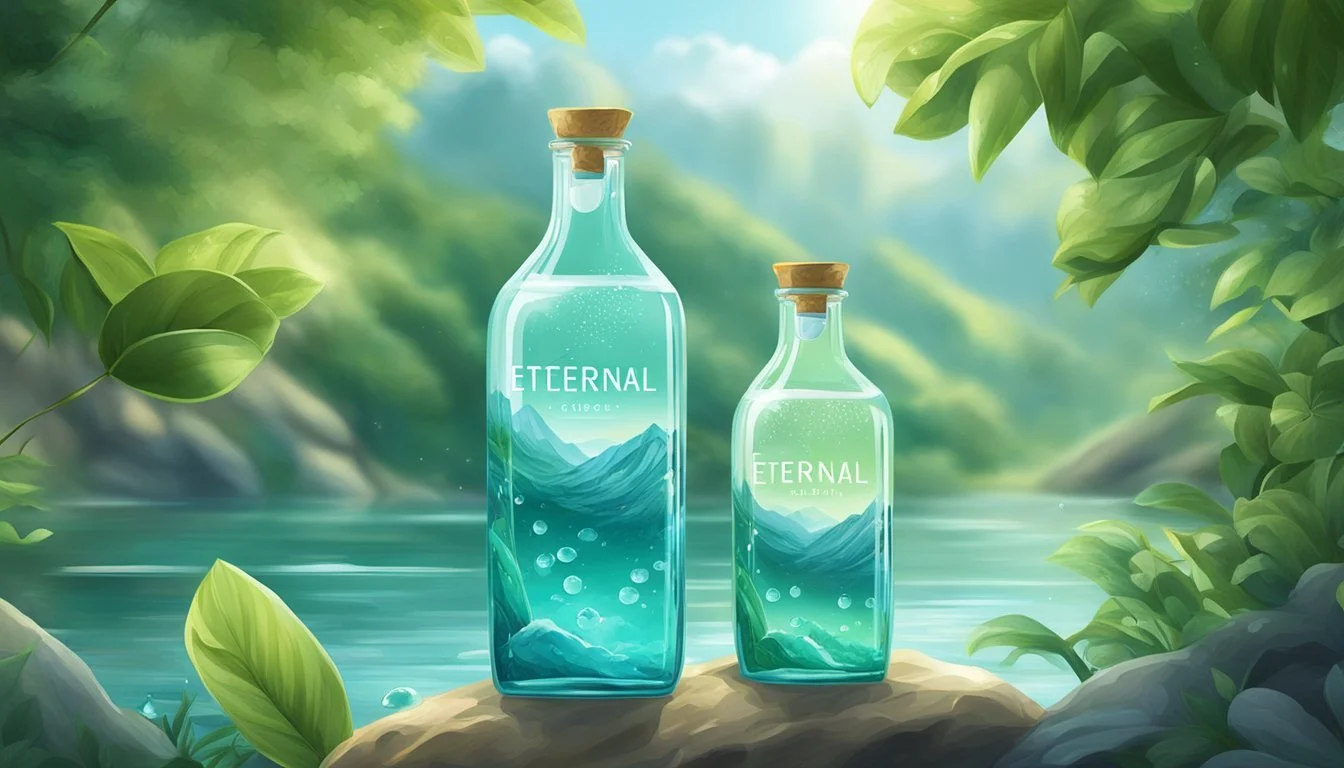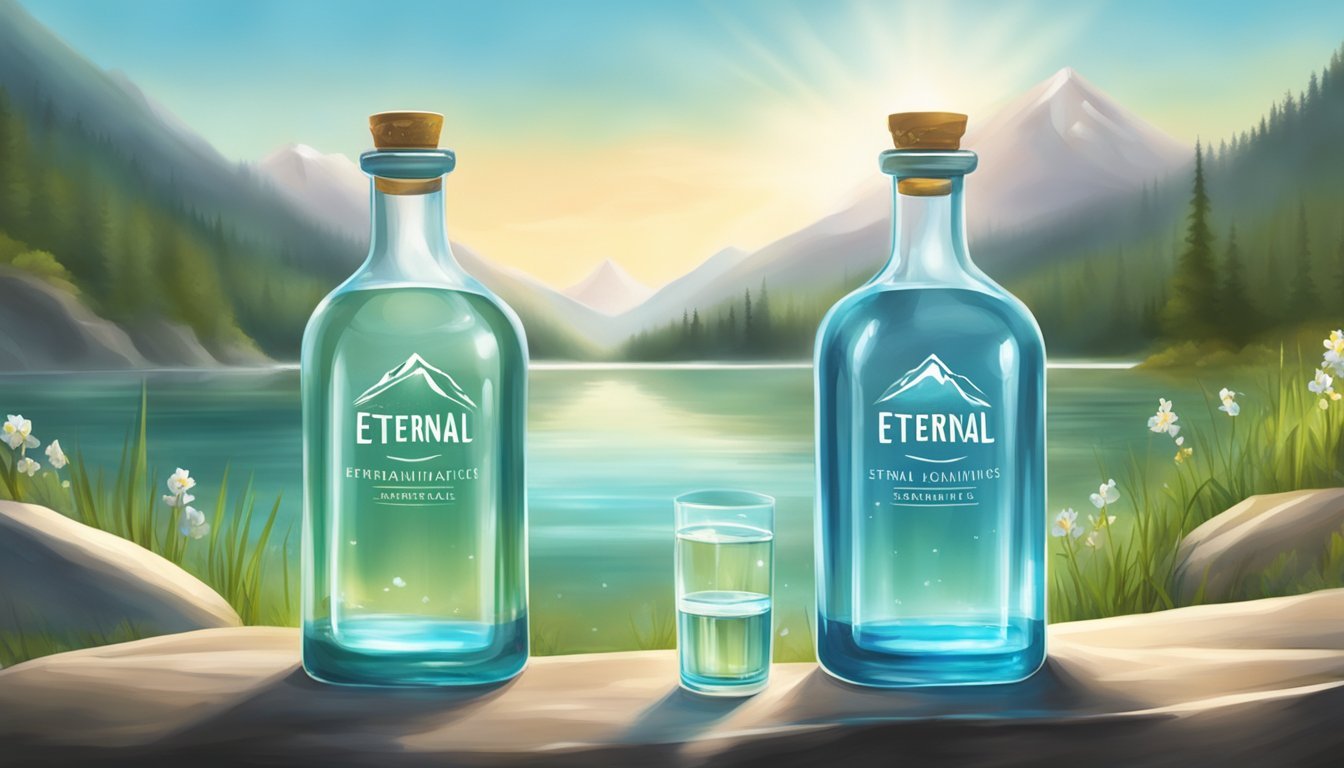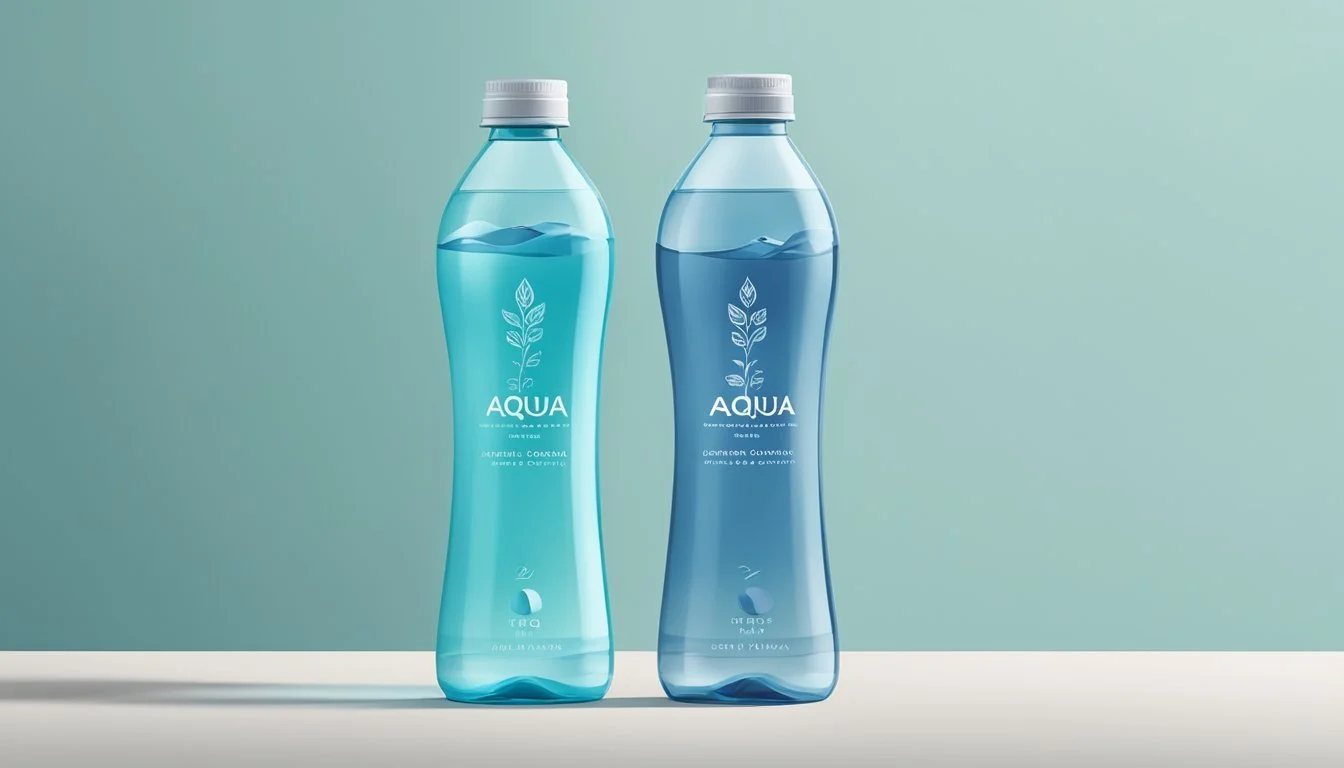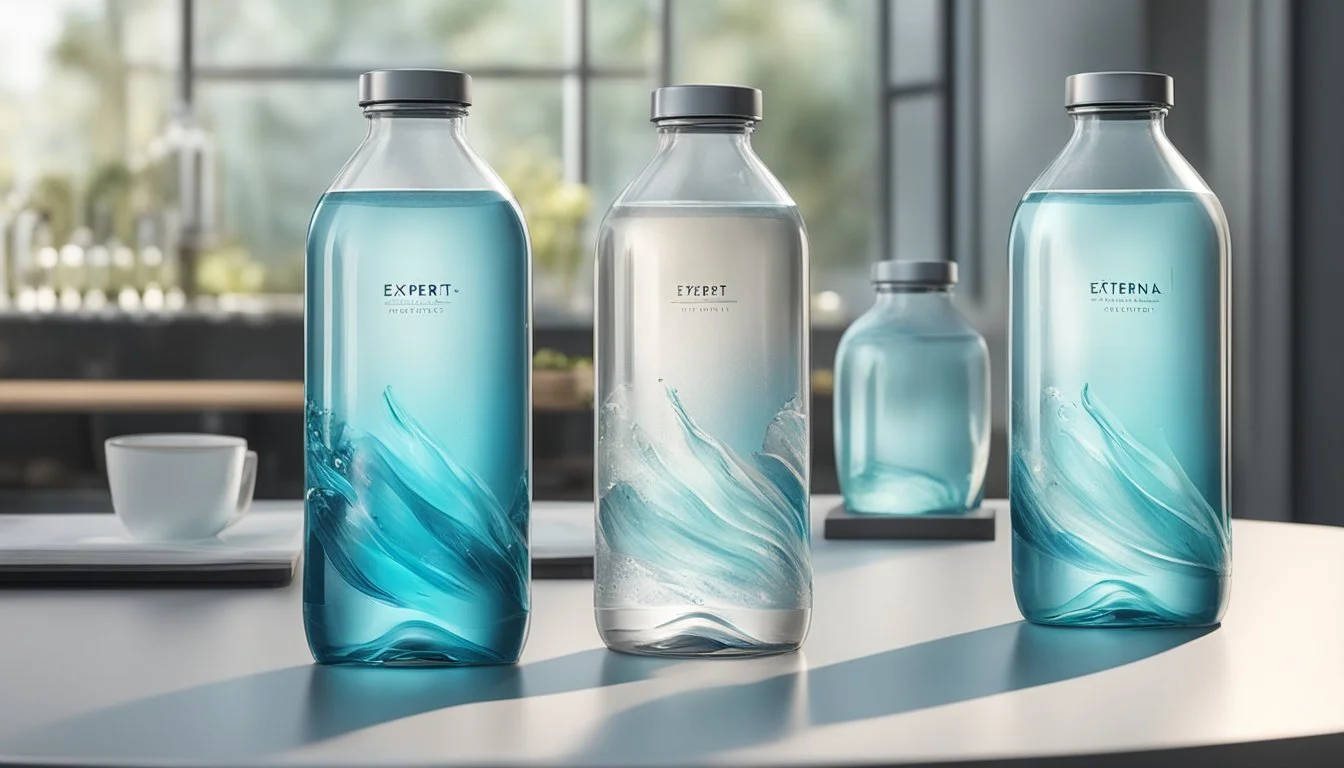Eternal vs. Aqua Carpatica
Which Bottled Water is Better for You?
Choosing between Eternal and Aqua Carpatica bottled water can be a challenging decision for those seeking optimal hydration and health benefits. Eternal water stands out for its naturally alkaline properties, boasting a pH level that supports balanced hydration. Derived from protected, pristine springs in the United States, it offers consumers consistent quality.
On the other hand, Aqua Carpatica presents a compelling case with its nitrate-free attributes and reasonable pricing. Originating from the Carpathian Mountains, this water is praised for its purity and natural mineral content.
When it comes to health and purity, Aqua Carpatica's nitrate-free formulation may give it an edge for those wary of contaminants. Both brands provide high-quality hydration solutions, but individual preferences for natural alkalinity versus nitrate-free benefits will guide the best choice for each consumer.
Understanding Bottled Water
Bottled water varies widely depending on its source and treatment process. Mineral water like Aqua Carpatica often comes from natural springs, containing essential minerals beneficial for health.
Purity is a significant aspect. Many brands ensure their water goes through rigorous filtration processes. For instance, some use reverse osmosis and ultraviolet exposure to achieve high purity levels.
The pH level of water can differ. Alkaline water, such as Essentia, typically has a pH of 9.5 or higher, which some believe offers health benefits.
Natural spring water often boasts lower sodium levels and fewer contaminants. Aqua Carpatica, for example, is noted for being naturally nitrate-free.
Brands, including Pure Life and Arrowhead, source their water from various springs, aiming to provide pure and refreshing hydration options.
The presence of minerals like calcium and magnesium can enhance the taste and nutritional value of bottled water, making it a preferred choice for many consumers.
Different bottled waters cater to different preferences and needs, whether it's the crisp taste of natural springs or the potential benefits of high alkaline content.
Origin and Source
Eternal Water and Aqua Carpatica both pride themselves on distinct sources and filtration methods that set them apart. These differences significantly influence the water's purity, taste, and overall quality.
Eternal Water: Volcanic Rock Filtration
Eternal Water originates from natural springs located in the USA, specifically in mountains with ancient volcanic rock. This unique geological feature provides a natural filtration system that enriches the water with essential minerals while keeping contaminants at bay.
Water percolates through layers of volcanic rock and limestone, which serve as natural filters. This process helps remove impurities and adds beneficial minerals such as calcium and magnesium.
Eternal’s source ensures the water remains pristine, making each bottle a reflection of nature's finest filtration.
Aqua Carpatica: Carpathian Mountains' Spring
Aqua Carpatica comes from the Carpathian Mountains in Romania, a region known for its ancient springs and untamed natural beauty. The water is sourced from springs deep within these mountains, harnessing the area's natural geology to maintain purity.
The Carpathian Mountains' natural springs are surrounded by wild forests, ensuring minimal human impact. The springs are naturally protected, preserving the water’s pristine quality and high mineral content.
Aqua Carpatica touts its nitrate-free quality, a significant selling point for health-conscious consumers.
Taste and Aftertaste Experience
Both Eternal and Aqua Carpatica bottled waters boast unique taste profiles, appealing to different preferences.
Eternal water presents a clean and crisp taste. It offers a refreshing sensation with every sip. Many users find the aftertaste to be neutral, making it a preferred choice for those who dislike lingering flavors.
Aqua Carpatica, on the other hand, is known for its naturally nitrate-free quality and low sodium level. This contributes to its pure, slightly sweet taste. The water taste is delicate and light on the palate.
In multiple taste tests, Aqua Carpatica often stands out for its slightly mineralized flavor profile. Users often report a refreshing, clean finish.
To summarize the taste and aftertaste experience:
Criteria Eternal Aqua Carpatica Taste Clean, Crisp Pure, Slightly Sweet Aftertaste Neutral Clean, Mineralized Finish Refreshing Taste Yes Yes Water Taste Light and Refreshing Delicate and Light
Health and Hydration
A comparison of Eternal and Aqua Carpatica in terms of health and hydration focuses on their electrolyte content, mineral presence, and pH levels, as well as their overall impact on the body's hydration and metabolism.
Benefits of Electrolytes and Minerals
Electrolytes such as calcium, magnesium, and potassium are crucial for maintaining proper hydration and muscle function. Eternal water is known for its natural mineral content, which supports sustained hydration.
Aqua Carpatica, with its naturally nitrate-free composition, boasts an impressive mineral profile that includes low sodium levels. This makes it a preferable choice for those looking to manage their sodium intake while still receiving essential minerals.
Both waters provide significant health benefits through their mineral content, contributing to healthy bodily functions and overall well-being.
Impact on Hydration and Metabolism
Proper hydration is vital for efficient metabolic processes. Eternal water, enriched with natural electrolytes, enhances hydration by helping the body balance fluid levels effectively. These electrolytes ensure that cells receive the necessary nutrients and oxygen for energy production and waste elimination.
Aqua Carpatica's low sodium level can prevent excessive water retention, aiding in optimal hydration without adding unnecessary sodium to the diet. This balance is crucial for individuals monitoring their salt intake, as excessive sodium can disrupt hydration and metabolic efficiency.
Both Eternal and Aqua Carpatica support hydration, which in turn can enhance metabolism and energy levels throughout the day.
Understanding pH Levels and Alkalinity
The pH level of water influences its alkalinity and acid-neutralizing capacity. Eternal water has a naturally alkaline pH, which some believe can help neutralize acid in the body and support a balanced internal environment.
Aqua Carpatica, with its focus on purity and low mineral content, maintains a neutral to slightly alkaline pH. This ensures the water is non-acidic while providing the benefits associated with consuming alkaline water.
Alkaline water is often promoted for its potential health benefits, such as improved hydration and reduced acid reflux symptoms. Both Eternal and Aqua Carpatica cater to individuals seeking the advantages of alkaline hydration without compromising on purity and quality.
Chemical Composition and Purity
Eternal and Aqua Carpatica both focus on unique chemical compositions and claim high purity levels. They offer distinct benefits that cater to different consumer preferences.
Eternal Water: Naturally Alkaline
Eternal Water is sourced from protected underground springs and meets high standards of purity. It is naturally alkaline, with a pH level typically ranging from 7.8 to 8.2.
This alkalinity contributes to a clean, smooth taste.
The water includes essential minerals like calcium, magnesium, and potassium. These minerals not only enhance the taste but also offer health benefits, supporting hydration and potentially aiding in maintaining the body's pH balance.
Eternal ensures its water undergoes minimal processing to retain its natural properties.
Aqua Carpatica: Naturally Nitrate-Free
Aqua Carpatica prides itself on its nitrate-free status, which is a significant advantage for health-conscious consumers. Nitrate levels in drinking water can be a concern due to links with various health issues, especially for infants and pregnant women.
This water is sourced from the Carpathian Mountains, known for their pristine environment.
With testing confirming zero nitrates, Aqua Carpatica also provides a natural mineral composition. The minerals include magnesium and calcium, which are beneficial for cardiovascular health and bone strength.
Its natural purity is maintained by careful bottling processes that prevent contamination.
Packaging and Environmental Impact
Eternal and Aqua Carpatica offer unique packaging solutions, each with their own approaches to sustainability and eco-friendliness. Comparing the types of bottles used, their sustainability, and the recycling practices reveal key insights into their environmental impact.
Types of Bottles and Sustainability
Eternal packages its water in recyclable PET plastic bottles, which are lightweight and have a lower transportation impact. The PET plastic used is non-toxic and often includes some percentage of recycled content, though this can vary by region and production facility.
Aqua Carpatica opts for both plastic and glass bottles. The glass bottles provide a more premium feel and are fully recyclable. Glass, while heavy, offers the advantage of being inert and more stable over time.
Key Points:
Eternal: Recyclable PET plastic, which potentially includes recycled content.
Aqua Carpatica: Uses both plastic and glass bottles, catering to different consumer preferences.
Recycling and Eco-Friendliness
Eternal's PET plastic bottles are widely accepted in recycling programs worldwide, making them relatively easy to process. This promotes better recycling rates and reduces the amount of plastic that might otherwise end up in landfills.
Aqua Carpatica's glass bottles are highly recyclable, and glass recycling rates tend to be higher than those for plastic. Their plastic bottles, like those of Eternal, are also recyclable, though glass is a more sustainable option due to its longevity and reusability.
Key Points:
Eternal: PET plastic widely accepted in recycling programs.
Aqua Carpatica: Higher recycling rates for glass, with glass being more sustainable over time.
Understanding the packaging and environmental impact of these bottled waters helps consumers make informed choices, contributing to more sustainable consumption habits.
Price Comparison and Value
When comparing Eternal and Aqua Carpatica bottled water, examining their price points and overall value is crucial.
Eternal water is generally found at higher price points in grocery stores and online platforms like Amazon. A 500ml bottle typically sells for around $1.50 to $2.00. Bulk purchases, such as 24-pack cases, may offer slight discounts but still remain on the pricier side.
Aqua Carpatica offers a more competitively priced option. A 500ml still or sparkling water bottle can be found for approximately £0.65 to £0.69 at retailers like Ocado. This more accessible price point provides excellent value for a product that emphasizes nitrate-free benefits.
Brand Price per 500ml Bulk Purchase Options Primary Retailers Eternal $1.50 - $2.00 24-pack available on Amazon Amazon, grocery stores Aqua Carpatica £0.65 - £0.69 24-pack options at Ocado Ocado, various grocery stores
Value Assessment:
Consumers looking for premium bottled water may justify Eternal's higher cost due to its marketing as an ancient, natural source. On the other hand, Aqua Carpatica offers a budget-friendly alternative with a focus on purity and health benefits, making it a strong contender in terms of value for price.
Market Presence and Availability
When comparing the market presence and availability of Eternal and Aqua Carpatica, both brands have distinct advantages and differences. This section highlights their retail and online distribution and contrasts their global outreach against more localized choices.
Retail and Online Distribution
Eternal Water: Eternal Water is readily available in many retail stores across the United States. Major supermarkets such as Walmart, Kroger, and Target stock this brand. Online, it can be purchased through e-commerce giants like Amazon and the company’s official website. This wide range of availability makes it easy for consumers to access.
Aqua Carpatica: Aqua Carpatica, while also available in several retail outlets, tends to have a stronger presence in specialty and health food stores. In the UK, it is often found in outlets like Whole Foods Market and Holland & Barrett. Online, Aqua Carpatica is accessible through platforms such as Amazon UK and its own official website. This focus on health-conscious retailers sets it apart.
Global Brands vs. Local Choices
Eternal Water: Eternal primarily targets the US market but has a growing international presence. It leverages its reputation as a premium spring water brand sourced from natural springs. This branding appeals to a global audience seeking high-quality water, yet its distribution outside the US remains limited.
Aqua Carpatica: Aqua Carpatica positions itself as a top-tier, naturally sparkling water from the Carpathian Mountains, appealing to a global market. It has a strong presence across Europe, particularly in health-centric regions. The brand’s distribution in both local markets and international platforms like Amazon enhances its accessibility globally. This dual approach makes it a formidable contender in both local and international markets.
Expert Insights
Experts have evaluated both Eternal and Aqua Carpatica, giving their opinions on taste, purity, and overall quality. They provide a clear comparison based on professional reviews and scientific studies.
Water Sommelier Reviews
Water sommeliers provide valuable insights into the quality and taste of bottled water. Martin Riese, a renowned water sommelier, often emphasizes the purity and natural taste of Aqua Carpatica. Describing it as clean with a balance of mineral content, he appreciates its nitrate-free composition and low sodium level.
In comparison, Eternal Water is often highlighted for its smooth and crisp profile. It is sourced from natural springs, boasting a balanced pH level that appeals to many. Reviewers from Olive Magazine have praised its fresh taste, noting the lack of aftertaste which adds to its appeal.
Comparative Studies by Authorities
Several comparative studies have been conducted to evaluate the quality and composition of different bottled waters. According to a study published by Life in Full Flavour, Aqua Carpatica's natural nitrate-free status and the low sodium level make it stand out. This feature is particularly beneficial for consumers concerned about nitrates in their diet.
Eternal Water undergoes rigorous purification processes, including micro-filtration and reverse osmosis, ensuring 99.9% purity. The water's mineral content and pH level have been shown to support overall hydration effectively. Studies often commend its consistent quality and compliance with safety standards. Additionally, customer feedback often highlights its refreshing taste and perceived health benefits.
More About Eternal
Eternal vs Icelandic Glacial: Which Bottled Water is Better?
Eternal vs Kirkland Signature: Which Bottled Water is Better?
Eternal vs Mountain Valley Spring Water: Which Bottled Water is Better?
Eternal vs Richard's Rainwater: Which Bottled Water is Better?
Eternal vs Whole Foods Italian Still Mineral water: Which Bottled Water is Better?
More About Aqua Carpatica
Acqua Pana vs Aqua Carpatica: Which Bottled Water is Better?
Aqua Carpatica vs Alkaline88: Which Bottled Water is Better?
Aqua Carpatica vs Cascade Mountain: Which Bottled Water is Better?
Aqua Carpatica vs Castle Rock: Which Bottled Water is Better?
Aqua Carpatica vs CBD Living: Which Bottled Water is Better?
Aqua Carpatica vs Crystal Geyser: Which Bottled Water is Better?
Aqua Carpatica vs Crystal Lake: Which Bottled Water is Better?
Aqua Carpatica vs Essence pH10: Which Bottled Water is Better?
Aqua Carpatica vs Hawaii Volcanic: Which Bottled Water is Better?
Aqua Carpatica vs Hawaiian Springs: Which Bottled Water is Better?
Aqua Carpatica vs Kirkland Signature: Which Bottled Water is Better?
Aqua Carpatica vs Liquid Death: Which Bottled Water is Better?
Aqua Carpatica vs Open Water: Which Bottled Water is Better?
Aqua Carpatica vs Proud Source: Which Bottled Water is Better?
Aqua Carpatica vs Purely Sedona: Which Bottled Water is Better?
Aqua Carpatica vs Richard's Rainwater: Which Bottled Water is Better?
Aqua Carpatica vs Simple Truth: Which Bottled Water is Better?
Aqua Carpatica vs Solan de Cabras: Which Bottled Water is Better?
Aqua Carpatica vs Talking Rain AQA: Which Bottled Water is Better?
Aqua Carpatica vs Weird Water: Which Bottled Water is Better?
Aqua Carpatica vs Whole Foods 365: Which Bottled Water is Better?
Aqua Carpatica vs Whole Foods Italian Still Mineral water: Which Bottled Water is Better?
Boxed Water vs Aqua Carpatica: Which Bottled Water is Better?
Core Hydration vs Aqua Carpatica: Which Bottled Water is Better?
Ice Mountain vs Aqua Carpatica: Which Bottled Water is Better?
Icelandic Glacial vs Aqua Carpatica: Which Bottled Water is Better?
Just Water vs Aqua Carpatica: Which Bottled Water is Better?
Mountain Valley Spring Water vs Aqua Carpatica: Which Bottled Water is Better?
Nestle Pure Life vs Aqua Carpatica: Which Bottled Water is Better?
Poland Spring vs Aqua Carpatica: Which Bottled Water is Better?
San Pellegrino vs Aqua Carpatica: Which Bottled Water is Better?
Smartwater vs Aqua Carpatica: Which Bottled Water is Better?
Topo Chico vs Aqua Carpatica: Which Bottled Water is Better?
Zephyrhills vs Aqua Carpatica: Which Bottled Water is Better?





